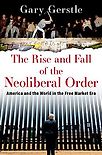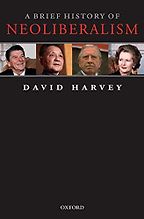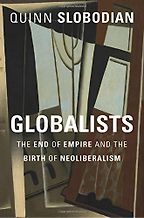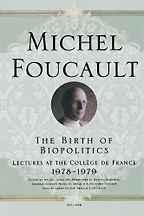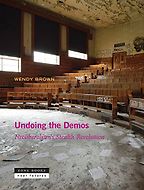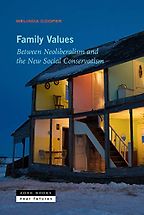Just before we turn to the books, could you give us a brief overview of what neoliberalism is? Is there some way of easily encapsulating it?
Definitions vary, but I think everyone agrees that neoliberalism is about unleashing capitalism to do its work, releasing it from regulatory controls and redistributive policies, allowing the system of private property, entrepreneurialism, innovation, and private gain to operate relatively unimpeded. It arose in reaction to an era when the societies of Europe and the United States had accommodated themselves to extensive regulations on capital and capitalism. This era arose from the experience of the Great Depression and total war, when it was thought that capitalism had wrought too much havoc—too many downturns, too much unemployment and inequality, too much human distress. Capitalism therefore had to be guided by the sure hand of a strong state able to regulate the economy in the public interest: smoothing out booms and busts, redistributing wealth, levelling the playing field between employers and workers, and establishing welfare programmes. Neoliberalism took shape in reaction to that system of managed capitalism.
Among those who study neoliberalism today, a key issue is whether neoliberalism was an ideology that simply called for the release of capitalism from its government shackles, or whether it demanded heavy involvement on the part of government both to smooth the operation of markets and insulate capitalist wealth from redistributive demands. I don’t dispute the fact that states are required to ‘order’ markets so that the latter can function ‘freely’. But I do argue that states ordering markets is not a new, neoliberal phenomenon. States were doing this work in the heyday of classical liberalism—the nineteenth century. Markets have never been naturally occurring phenomena, even if we concede, with Adam Smith, that people have a propensity to truck, barter and exchange.
“Neoliberalism is about unleashing capitalism to do its work”
Markets only work over the long term if they are governed by rules about what constitutes private property; what the fair terms of exchange are; what the penalties for breaking contracts are, and so on. States are necessary to make and implement those rules, meaning that they have always been involved in the construction of markets; such government involvement does not mark something that’s new about neoliberalism. Neoliberalism is better understood as an attempt to recover an approach to political economy that was characteristic of classical liberalism in the 19th century. Neoliberalism, like classical liberalism, seeks to release capitalism from its fetters—and to use state power only insofar as it strengthens free markets and protects them from those who want to make them ‘less free’.
Let’s move on to the books. First up is David Harvey A Brief History of Neoliberalism. Tell us about it.
First published in 2005, Harvey’s book probably remains the best short history of neoliberalism. It defines neoliberalism as an ideology that seeks to unleash capitalist dynamism, and to improve the conditions of capitalist accumulation along the lines that I just suggested.
Harvey argues that neoliberalism emerged in the 1970s during a crisis of ‘capital accumulation,’ or ‘capital disaccumulation’. This was a moment when capitalists were not able to amass capital on the desired scale, or make the kind of profits to which they had become accustomed. The postwar economic miracle of Europe and the postwar expansion in the United States were slowing down; stagflation, shrinking profit margins, and declining productivity rates were symptoms of economies in decline. In this moment of economic stress, capitalists began to question the compromises that they had previously struck with workers to redistribute a portion of their wealth downward through the social order. They now viewed such redistributionist policies as a drag on profits and on capital accumulation. They sought to release themselves from those fetters and to reinvigorate capitalism once again. Harvey is very good at discussing the response of capitalists to the crisis of the 1970s.
Harvey views neoliberalism as an elite project, as a strategy by and for capitalists to reclaim lost power and to reject older arrangements governed by the principles of class compromise. He sees this project as having made its greatest progress in the United States and Great Britain, epitomised by the rise of Ronald Reagan and Margaret Thatcher. Even though he recognises neoliberalism as an elite project, Harvey understands that it had popular appeal among masses of ordinary people in Britain and America. How did an elite project of that sort persuade voters in democratic societies to go along with it?
Get the weekly Five Books newsletter
Harvey’s answer is not entirely satisfying, but simply posing this important question is one of his book’s achievements. Too many scholars writing about neoliberalism simply presuppose that elites were able to impose their views on the masses either through a brute exercise of their power or through ideological deception—selling the voters a bill of goods, filling their minds with ‘false consciousness’. The Koch brothers are an interesting and illustrative case in this respect. They are among the richest capitalist families in the United States. They are passionate advocates for removing the state from all the ways in which it might impede capitalist accumulation and development. They are deeply involved in politics and support all kinds of political groups aligned with their ends. They often act furtively so as to make it seem as though the political groups that they are funding are grassroots movements operating independently and from the bottom up.
The Koch brothers do act furtively; they do deceive. But treating mass support for the positions they espouse as a phenomenon generated entirely by elite manipulation is problematic. The question of consent—how ordinary people voluntarily give their assent to an elite project—is a critical one. It is a question that we must satisfactorily answer—and that my new book on the neoliberal order attempts to answer—if we are to understand the enduring power and mass appeal of neoliberal beliefs.
Harvey’s history is also a global history. He understands that neoliberalism aspires to be a global project and requires a set of international institutions, including the International Monetary Fund, the World Bank, and the World Trade Organization, to make that aspiration real. He analyzes the Washington Consensus—a set of policies developed in the Global North to impose neoliberal economic principles on the Global South. He also pays quite a lot of attention to China’s reorientation away from communism and toward capitalism, a tendency that accelerated dramatically in the wake of the Soviet Union’s early 1990s disintegration. The collapse of communism allowed capitalism—and neoliberal principles—to go global in the 1990s in a way that had not been possible during the decades of Soviet influence and power.
Tell us about Quinn Slobodian’s book Globalists: The End of Empire and the Birth of Neoliberalism.
Slobodian shares Harvey’s conviction that neoliberalism must be understood as a global project, and, also, that states have a lot of work to do to establish markets and to elaborate codes of law designed to insulate private property and mechanisms of exchange from undue popular ‘interference’. But Slobodian’s focus is different from Harvey’s. He tracks neoliberalism back to its origins in 1920s and 1930s Vienna and, later, Geneva.
Key economists involved in birthing neoliberalism—men such as Friedrich Hayek and Ludwig von Mises—were Viennese. Why was Vienna so important, as opposed to Berlin, Paris, or London to the elaboration of this doctrine? Slobodian’s answer has to do with the urgent desire of some who lived through the disintegration of the Austro-Hungarian empire to reproduce on a global scale what they regarded as their empire’s greatest achievement: the creation of a prosperous zone of free trade and market development across numerous lands, a political economic arrangement that, in their eyes, allowed the many peoples who inhabited those lands to maintain their own cultures and traditions. The Austro-Hungarian empire, in the view of Hayek and others, had built a free market economy that was itself robustly international and multicultural.
“The question of how ordinary people voluntarily give their assent to an elite project is a critical one”
Hayek and von Mises were among those who regarded the rise of socialism and communism in post-World War I Europe as abhorrent. They were scarcely more comforted by Woodrow Wilson’s principles of self-determination for all peoples. They viewed the new states emerging from a collapsing Austro-Hungarian empire as arousing too many raw emotions about national and ethnic pride. These self-determining nations, they believed, would soon be warring against other self-determining nations, and persecuting minorities in their midst. Hayek and von Mises did not trust democracy either, and worried that national legislatures elected by voters aflame with national pride and socialist aspirations would vote to break up the fortunes of the rich—and undermine capitalism—in the pursuit of an equality that could never be achieved. The ethnic and democratic passions of the masses had to be contained.
One way to do that was to give the political economic underpinnings of the Austro-Hungarian empire a new life. Hayek wanted to bring into existence a world (as opposed to a mere region of central and eastern Europe) guided by an economically liberal constitution and international governing institutions to enforce it. These institutions, once established, would set the rules for free trade, protection of private property, enforcement of contracts, and capitalist development. These institutions would not literally supplant nations as units of governance; but they would constrain nations that had violated liberal rules of global economic exchange. Nations would find themselves encased in a world of free markets overseen by international institutions that possessed authority, on critical economic matters, greater than nations themselves.
Isn’t that what happened to some extent after World War II with the Bretton Woods institutions—the IMF, World Bank, and the General Agreement on Tariffs and Trade (GATT)? Was the creation of those institutions greatly influenced by the Austrians?
Yes. Slobodian tracks how ideas that had emerged in 1920s Vienna took concrete form in 1940s Geneva, where international institutions of the sort imagined by Hayek began to take root. Now, of course, Geneva would have counted for little had the US not emerged from World War II as a superpower, able to enforce a Pax Americana on the non-communist world. Switzerland could never serve as the cockpit for a reincarnated Austro-Hungarian empire were it not backed by American economic and political power. Bretton Woods, the International Monetary Fund, the World Bank, and GATT, all devised in 1940s, provided the blueprints for this new liberal international order. Slobodian argues that many of the key ideas for these blueprints originated with Viennese economists looking for ways to make the principles of a now ghostly Austro-Hungarian empire relevant to a post-WWII world. It’s quite a fascinating argument about how a set of imperial ideas survived the death of empire.
This new international order had an imperial dimension redolent of what had once animated the Austro-Hungarian. It took the form of nations in the Global South that were formally independent but that were, in reality, subordinated to the national powerhouses (and the international institutions that served them) of the Global North.
In Slobodian’s work, the 1970s was not simply a crisis of capital accumulation in the Global North, which had been Harvey’s focus. The crisis had also been precipitated by nations in the Global South attempting to alter the terms of trade, and more broadly, the imperial system of which they were a subordinate part. One sees this crisis emerging most immediately and clearly in regard to petroleum production in the Middle East, as in the 1970s instances when OPEC announced that its members would henceforth set production and price levels that suited their needs rather than those of the Global North.
Is he suggesting that the Global South was excluded, or that the terms of on which it was included were prejudiced against it?
I think it’s more the latter. But keep in mind that the struggle between the Global North and Global South was shaped by the existence of a vast communist world that was deeply antagonistic to all forms of capitalist enterprise. The architects of a neoliberal world order often had to make concessions to countries in the Global South to keep them from shifting their allegiance to the Soviet Union and to China. As long as a communist world existed, and as long as it was determined to cut itself off from capitalist penetration, the neoliberal order imagined by Viennese and Genevan neoliberals could not become truly global. That is why neoliberalism could not triumph internationally until the 1990s, when the Soviet Union fell and China chose a capitalist road for itself. The rise and fall of communism, and its relation to neoliberalism, receives too little attention in Slobodian’s work.
Should we move on to Michel Foucault’s The Birth of Biopolitics: Lectures at the College de France. What does this book tell us about neoliberalism?
These are lectures that Michel Foucault gave at the College de France in 1978 and 1979. They were only published in English in 2008. They still constitute some of the most interesting writing on neoliberalism. Foucault’s concerns are very different from those of Harvey and Slobodian. Harvey and Slobodian were mostly concerned with macro issues: capital accumulation, markets, institutions to govern markets and masses, and so on. Foucault was most interested in the ‘micro’—how the ideology of neoliberalism acted on the mind and bodies of individuals. Foucault had long been interested in how broad ideological structures encased individuals in modes of thought over which they had little control. Knowledge was power, especially when that knowledge was organized into systems of thought that rendered human individuals—and human populations as a whole—legible, controllable, and governable.
Foucault saw in neoliberalism an ideology that vastly increased the terrain of human activities that could be understood by reference to market principles. In classical liberalism, homo economicus, or ‘economic man’, was defined as a man of exchange, who swapped his labor for a wage. The resulting income he then exchanged for goods in the marketplace that he either needed or desired. Much economic analysis revolved around how the two economic spheres of ‘production’ and ‘consumption’ were to be structured. Other realms of human activity—the family, religion, and politics, for example—were thought to stand apart from these two major arenas of economic exchange, and outside the realm of activity encompassed by homo economicus.
“Foucault saw in neoliberalism an ideology that vastly increased the terrain of human activities that could be understood by reference to market principles”
Foucault argued that economic man could not be comprehended in such narrow terms. Rather, economic man had to been as a repository of capital him- or herself. He was the producer of his own wants and needs; he was what Foucault called ‘an entrepreneur of the self’, ‘being his own capital’. The concept of homo economicus, therefore, had to be expanded to include the various investments that such a man and others had made in his personhood. A capitalist of the self, homo economicus was always being called upon to deploy his capital so as to satisfy his needs and wants. Deploying such ‘human capital’ required knowledge of how much capital, and of what sort, each person possessed. Acquiring such knowledge meant bringing into economic discourse aspects of human existence at one point considered separate from economic calculation: marriage, family, morality, education, even sport.
From this perspective, human beings are understood to be making calculations all the time about what kind of capital they have, how to amass inputs and deploy outputs. ‘Human capital’ might refer to one’s education, or one’s muscle mass, or one’s investment in a marriage partner. It might refer to child raising, now understood as a series of capital investments in the next generation’s future. It was time, neoliberals argued, to push aside the notion that parents should be inculcating something as vague as moral virtue in their children. It was time, instead, for parents to start thinking about instilling a set of advantages in their offspring that would position the latter, once grown, to make the best use of their futures.
This way of looking at the world was popular among a 1940s group of German neoliberals who called themselves ‘ordoliberals’. Then it moved to the United States and to the University of Chicago’s Department of Economics, in particular, where it informed a major stream of thinking associated with what came to be known as The Chicago School. The Chicago economist Gary Becker was a leading innovator, in this regard, who early on analysed the family in human capital terms.
Foucault was ambivalent about this neoliberal theory. The libertarian in him was drawn to the notion of an individual being a repository of capital with the capacity to become an entrepreneur of the self. On the other hand, there was something terribly tyrannical and dehumanizing about reducing all human activity to a series of inputs and outputs.
That’s interesting. It’s precisely that sort of freedom in isolation that is at the root of so much contemporary criticism of neoliberalism; its ability to abstract a human being from the social context in which their lives should be rooted.
Well, Foucault saw both sides—the freedom and the tyranny. But not Wendy Brown, a political theorist very much influenced by Foucault. In her book, Undoing the Demos: Neoliberalism’s Stealth Revolution, she castigates this form of neoliberal thinking for transmogrifying all human relations into calculations of gain and loss, allowing such reasoning to penetrate, contaminate, and ruin everything.
That’s your next recommendation. When did Wendy Brown publish her book, Undoing the Demos: Neoliberalism’s Stealth Revolution?
In 2015, about a decade after Foucault’s book on biopolitics. Though not a classical liberal herself, Brown respected classical liberalism precisely for separating homo economicus from other aspects of human life. In other words, it’s one thing to analyse inputs and outputs in terms of the economic spheres of production and consumption; one had to do that in order to understand how well or how poorly an economy was working. But classical liberals also believed that there were realms of life that economic reasoning should not touch: e.g., the family, love, morality, and democracy. Healthy human relationships and democratic forms of self-government could not be reduced to a series of inputs and outputs and constant calculation of gains and losses.
Adam Smith, the great Scottish political economist of the 18th century, author of The Wealth of Nations, wanted everybody to truck, barter and exchange. He thought this was the way of the world. But he also wrote a philosophical book, The Theory of Moral Sentiments. In the latter book, the realm of morality and family and education and governance lay apart from the economic realm he had analysed so thoroughly in The Wealth of Nations. In other words, there was a point in limiting the world of homo economicus to production and exchange. Wendy Brown sees neoliberalism as spreading homo economicus everywhere. Think of all the calculating of gains that we do now on a daily basis, often without really being cognizant of what we’re doing: How many people ‘liked’ my tweet or my Facebook posting? How many steps did I walk today? How many flights of stairs did I climb? In the 1990s heyday of tech utopianism, which I write about in my book, it was thought that this kind data was going to set humanity free, and allow each of us to become ‘all that we could be’. Brown writes that the drive to acquire such knowledge does not generate a path toward freedom. It is a form of un-freedom, a snare. Brown argues that this form of reasoning and analysis has infected just about everything, and it has made us worse off.
The 1990s moment of neoliberal and tech utopianism is gone, but we are ever more inundated with the data that the IT revolution of those years has generated. A large scale revolt against the constant measuring of one’s self, similar in spirit that animated the 1960s counterculture, has not yet materialized. It will at some point. But it’s notable that it has not happened yet. The hegemony of the neoliberal order has cracked, but forms of neoliberal reason still deeply influence our lives.
Is Wendy Brown basically just dismantling neoliberalism in her book? Or does she also offer a positive vision of how we could replace it?
Brown sees nothing positive in neoliberalism. She wants us to recover an older notion of humanity, one that calls on us to judge ourselves by the quality of our democracy, or the quality of our morality, or the quality of our educational system. She wants us to pursue a life in which human aspirations are freed from the tyranny of inputs and outputs.
Let’s move on to the last of your recommended books, Melinda Cooper’s Family Values: Between the Neoliberalism and the New Social Conservatism. What story does this book tell?
Melinda Cooper also focuses on the micro level, as do Foucault and Brown. But for her the most important institution at the micro level is not the individual but the family. She shows how neoliberals identified the family as a critically important institution, necessary in a neoliberal world to provide the kind of regulation that government would no longer supply itself. The supporters of neoliberalism wanted to create, on the one hand, free markets in which people were free to buy and sell as they wished and without external restraint; on the other hand, they also understood the dangers of market excess. Once you free people from constraint, you face the problem that people will not be able to restrain themselves. They might be tempted by the allure of markets to go into debt, to spend more money than they possessed. They might indulge too much a desire for alcohol, drugs, and sex. They might lose their jobs. They might cease to function as responsible citizens.
If neoliberals wanted to shrink the state and eliminate it as force for regulation, economic or moral, what moral regulatory force did they imagine might take its place? The answer they gave was the family. Family responsibilities would constrain men unable otherwise to properly constrain themselves. Wives would discipline husbands. Mothers would teach their children the ways of the world, inculcating the values and morality necessary to flourish in a world of market freedom.
Five Books interviews are expensive to produce. If you're enjoying this interview, please support us by donating a small amount.
In her book, Cooper analyses two groups who were thinking about the role of families in a neoliberal world. Neoconservatives believed that only patriarchal families of the traditional sort could provide the necessary market and moral discipline. These were families in which the man was the breadwinner and the woman was the homemaker, raising children. The woman’s primary responsibility was twofold: first, to put food on the table every night to take care of her man and get him ready for the next day of toil; and second, to bear children and inculcate in them proper moral values. All the better if these families had faith and followed in the ways of the divine. Love of country also would spring from these patriarchal, God-fearing families. The kind of micro society nurtured in such families would serve the macro world of free market economies well. This was the orientation of neo-Victorian thinkers such as Gertrude Himmelfarb and religious leaders such as Jerry Falwell.
Another group thinking about the family in the neoliberal era were not committed to the patriarchal, heterosexual family model. Families, they argued, could come in all shapes and sizes. Cooper is particularly interested in how many gay men and women came to prioritise marriage and family life in the 1990s and 2000s, moving away from the queer politics that had dominated their movements in the 1980s. One might see this development as a natural response to the AIDS crisis of the 1980s. But Cooper helps us to see that the move toward marriage and family life also facilitated a process through which gay men and women accommodated themselves to the neoliberal order. Their families were very different than the ones that Jerry Falwell celebrated. But their existence spread further the conviction that families were the critical moral and disciplining force in a world given over the market freedom. This move toward family life both legitimated gay life in ways that had previously proved elusive and strengthened the hegemony of the neoliberal order. Though Cooper’s book is very different from David Harvey’s, it raises once again the issue of consent: how such diverse groups of people came to believe that neoliberalism should guide the present and future of American society.
Did von Mises and Hayek, when they first thought about the economics of this international economic world order that they envisioned, worry about it being undergirded by strong families?
Von Mises and Hayek did not write much about families. Wilhelm Röpke (a German ordoliberal of the 1940s,), however, devoted a great deal of thought to the broader issue that the family question raises: namely, which peoples of the world were capable of developing the virtue and discipline necessary to flourish in market societies? And Röpke’s answer was: those peoples who were European and raised in Christian traditions. By the 1960s, he had come to doubt the ability of non-Europeans and non-Christians to thrive in free market economies, which helps to explain why Röpke became a supporter of Apartheid in South Africa. Neoliberals in America were generally more optimistic, believing that strong families could flourish in every group, regardless of that group’s race, ethnicity, or religion. But one can also detect a Röpkian-style pessimism (and racism) in the broad acceptance in America of mass incarceration during neoliberalism’s heyday. Mass incarceration, after all, had the effect of stripping millions of individuals, disproportionately African American and Latino, of the opportunity to participate in America’s market economy.
Five Books aims to keep its book recommendations and interviews up to date. If you are the interviewee and would like to update your choice of books (or even just what you say about them) please email us at [email protected]

